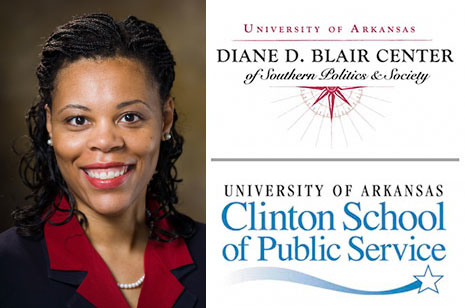
FAYETTEVILLE, Ark. –The United States is projected to become a majority-minority nation for the first time in 2043, a pattern already evident in communities throughout the nation. Whites are expected to remain the largest single group; however, no group will comprise a majority.
This demographic shift will have significant impact on electoral outcomes, according to results from a nationwide academic poll.
Pearl K. Dowe, assistant professor of political science and African American studies at the University of Arkansas, addresses African American public opinion in the latest analysis of results from the Blair Center-Clinton School Poll. The full report was released Wednesday, June 12, and may be found at the poll’s website.
According to poll results, African Americans have a greater sense of political commonality with Latinos than with whites when it comes to issues like political power and representation. African Americans also report a greater sense of overall competition with whites than with Latinos.
“Although African Americans were a significant voting block in 2012, their marginalized existence weakens their political strength thus increasing the need for political coalitions,” said Dowe. “How African Americans view Latinos and whites will be critical to their ability to advance their economic and political agenda.”
When asked about political power and representation, 36 percent of African Americans reported having something in common with whites while 48 percent stated the same in reference to Latinos. Similarly, 44 percent of African American respondents reported little to nothing in common with whites while only 29 percent stating they had little to nothing in common with Latinos.
In responding to questions about a sense of competition with other groups, 71 percent of African Americans reported having some to a lot of competition with whites and 64 percent reported the same sense with Latinos.
To gauge the American political landscape in the aftermath of the 2012 presidential election, the Diane D. Blair Center of Southern Politics and Society in the J. William Fulbright College of Arts and Sciences at the University of Arkansas and the University of Arkansas Clinton School of Public Service, conducted a comprehensive national poll of political preferences and behaviors among 3,600 respondents. The 2012 Blair Center-Clinton School Poll, with an oversample of African Americans, addresses the serious dearth of data available to politicians and researchers striving to understand this dynamic segment of the American populace.
“African Americans have consistently increased their level of political engagement at the national level when mobilized to do so,” said Dowe. “If the model of mobilization that occurred in 2008 and 2012 continues and expands to local, state and midterm elections there could possibly be a shift in political power within the South and in other areas where there are large concentrations of African Americans.”
In addition to the information on political commonality and competition, the full report contains comparisons among the three groups on quality of life questions such as health care, home ownership, educational attainment, income and unemployment. The report also addresses political attitudes toward abortion, discrimination, immigration and gay marriage.
“This group is still addressing disparities in income, education and health,” said Dowe. “It will be critical for African Americans to utilize their increasing political leverage to develop coalition partners and seek new forms of activism to alleviate the existing problems throughout African-American communities.”
Additional reports from the Blair Center-Clinton School Poll will be released throughout the year. Future topics include comparisons of political attitudes between those in the South vs. non-South. For more information about the Blair Center-Clinton School partnership, please visit the poll website.
About the Partners:
The Diane D. Blair Center of Southern Politics and Society was established in 2001 by an act of U.S. Congress. This research center was named in honor of Diane Divers Blair who taught in the political science department of the University of Arkansas for 30 years. The Blair Center reflects her academic model and strives to approach the study of the American South from a variety of angles, attempting to reveal the undercurrents of politics, history and culture that have shaped the region.
The nation’s seventh presidential school, the University of Arkansas Clinton School of Public Service is the first school in the nation to offer a Master of Public Service (M.P.S.) degree, giving students the knowledge and experience to further their careers in the areas of nonprofit, governmental, volunteer or private sector service. Additionally, the mission of the Clinton School’s Center on Community Philanthropy, directed by Charlotte Williams, is to promote issues and research into community-based philanthropy and its role in generating social, economic and political change.
Topics
Contacts
Darinda Sharp, director of external affairs and alumni outreach
School of Journalism and Strategic Media
479-595-2563,
dsharp@uark.edu